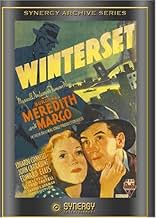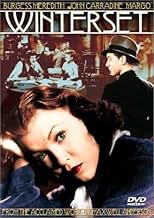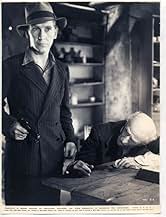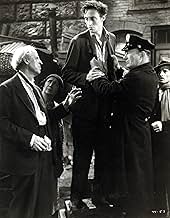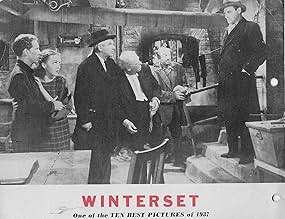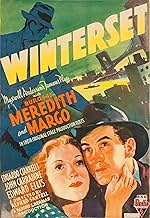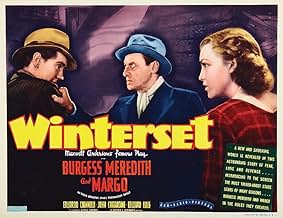VALUTAZIONE IMDb
6,1/10
526
LA TUA VALUTAZIONE
Aggiungi una trama nella tua linguaImmigrant radical Bartolomeo Romagna is falsely condemned and executed for a payroll robbery. Years later, his son Mio sets out to find the truth of the crime and to bring to account the gan... Leggi tuttoImmigrant radical Bartolomeo Romagna is falsely condemned and executed for a payroll robbery. Years later, his son Mio sets out to find the truth of the crime and to bring to account the gangster Trock Estrella.Immigrant radical Bartolomeo Romagna is falsely condemned and executed for a payroll robbery. Years later, his son Mio sets out to find the truth of the crime and to bring to account the gangster Trock Estrella.
- Regia
- Sceneggiatura
- Star
- Candidato a 2 Oscar
- 4 vittorie e 4 candidature totali
Murray Alper
- Louie
- (non citato nei titoli originali)
Recensioni in evidenza
Maxwell Anderson's Pulitzer Prize winning Broadway play was brought to the screen by RKO in 1936 with the original cast members, and Anderson himself adapting the Screen-Play.........The results were a hard-hitting expose' of injustice in the Judicial system of the 1920s........Based loosely on the Sacco-Vancetti trial of the 1920s, Anderson wrote a powerful adaptation of his Stage hit...........Burgess Meredith, along with Eduardo Ciannelli reprised their Stage roles as Mio, and Troc Estrella respectively in their first screen appearences......Both would go on to do scores of films and stage work for decades to come after Critic's raved about their work in "Winterset"......Set under the Brooklyn Bridge for most of the film, the characters involved in the injustice, assemble seeking the truth & to avoid it becoming public knowledge.........Ciannelli's "Troc Estrella" is one of the screens most dastardly bad guys of all time......and Stanley Ridges is a standout as "Shadow' his henchman...............The Musical score by Nathaniel Shilkret & Max Steiner(un-credited) was nominated for an Oscar.......It was so compelling in this Dark-Drama, that Orson Welles used portions of it in his film "Journey Into Fear'-1942....also released by RKO.......If you are a fan of fine Dramatic Acting, superb musical scoring, and very early film noir(1936)....you should see "Winterset.......Tense, Poetic, and spell-binding....It is available on Video and DVD at Amazon.com, for a very low price.......Respectively submitted, sasheegm at the movies
Call it Vintage, if you will, but you will not call Winterset boring unless a world of interesting details bore you. The movie is full of sub-stories, full of details that bring back the early days of everyday troubled life for Americans, especially New Yorkers. While not actually typical, the story is one that hangs together.
I suspect the story plot and actor management of the story were perfected on Broadway long before going to film. It is both engaging and fascinating for movie buffs who are students of the perfected B/W film and is a study in filmography which makes one wonder if this is not the height of perfection, if you will, concerning films of that genre: Good story, good delivery and good conclusion.
The story is not one with a tragic ending for the principles. It is not one that builds up the viewer's expectations and hopes and then dashes them in the end. While there are hints of evil and tragedy, the people most deserving receive this end, the ones who deserve the best of the ending actually do get the best in the end.
The organ music is superb for selection and for an almost hypnotic melody that plays on in one's head for some time afterward. A nice, pleasant melody. And on it hangs the turning point in the movie, a grand hook to hang the ending.
The antics of the policeman is what one would expect of one of New York's finest of that era. A masterful job of acting.
Most of all, Margo! She was again engaging, spell-binding and her job well-done. She caused the viewer to want to provide her sympathy from a good and kind father, who was incapable of doing all he could for his children, and to a brother who was caught up in a crime and later regretted it and who endeavored to correct his mistake. Again, superb acting.
Overall, Winterset stands out as one of the most enjoyable movies I have ever watched. I try to share it with friends who have never seen it before. None who see it for the first time have been disappointed.
I suspect the story plot and actor management of the story were perfected on Broadway long before going to film. It is both engaging and fascinating for movie buffs who are students of the perfected B/W film and is a study in filmography which makes one wonder if this is not the height of perfection, if you will, concerning films of that genre: Good story, good delivery and good conclusion.
The story is not one with a tragic ending for the principles. It is not one that builds up the viewer's expectations and hopes and then dashes them in the end. While there are hints of evil and tragedy, the people most deserving receive this end, the ones who deserve the best of the ending actually do get the best in the end.
The organ music is superb for selection and for an almost hypnotic melody that plays on in one's head for some time afterward. A nice, pleasant melody. And on it hangs the turning point in the movie, a grand hook to hang the ending.
The antics of the policeman is what one would expect of one of New York's finest of that era. A masterful job of acting.
Most of all, Margo! She was again engaging, spell-binding and her job well-done. She caused the viewer to want to provide her sympathy from a good and kind father, who was incapable of doing all he could for his children, and to a brother who was caught up in a crime and later regretted it and who endeavored to correct his mistake. Again, superb acting.
Overall, Winterset stands out as one of the most enjoyable movies I have ever watched. I try to share it with friends who have never seen it before. None who see it for the first time have been disappointed.
Despite having read the liner notes, I thought from the publicity artwork that WINTERSET would be something Gothic. It is Gothic, in its bleakness, but is squarely centered in the Depression era of the United States. It was completely of it's time, and considering that the film was adapted from the Broadway play, it must have been daring, with sub themes of socialism and police corruption. (The play was by Maxwell Anderson, who wrote KEY LARGO and THE BAD SEED.) Perhaps that contributed to the film receiving two Academy Award nominations.
This is the story of Mio (Bartholomio a young, dewy Burgess Merideth) trying to clear his father's name. In the first scenes, his namesake Father, played with riveting stillness by the painfully thin John Carradine, was accused of murder he did not commit, given no defense, and put to death. Years later, his son goes to the slums of New York to try to find out the truth.
I had to remind myself that this was made in 1936, so it is still very early in the talkies. The sets are a wonderful blend of realism and expressionism (similar to the famous stage sets of Arthur Miller's A VIEW FROM THE BRIDGE), giving this a Gothic noir flavor. Rain is often used as a "purifier" in stage and film, but here it is effectively used to create an oppressive humidity, a torrent of sludge. It is clear that film noir, Orson Wells, and THE THIRD MAN's Director Carol Reed all owe a debt to early films like this. The set elements are all here in tight proximity, the stone, the shadowed doorways, the waterways.
In fact, one irony is that one of the lead actors does look very much like Orson Wells. He plays the brother of Mariama (played by Margot, who is probably best known as the duplicitous woman in Capra's LOST HORIZON). Margot's transition to film is not as ideal as Merideth's, her style is more of the old school careful vocal production that may be the product of overcoming an accent. But she looks luminous and innocent, and fills the screen with a simple hopefulness at odds with the dark surroundings. The villain of the piece is simply fantastic completely believably sociopathic without any extravagant ticks or frothing at the mouth.
This is pre-method-acting, but that spare realism is all here, especially in the performances of Carradine and Merideth. This entire film holds up as a moment of history of social themes and thought of that day that still resonate. The Broadway cast seems to have been lifted intact (which should be a lesson to modern filmmakers to use stage actors instead of vice-verse). There are one or two flowery monologues, but for the most part, the transition from stage to film goes very well, and the story and script are spare and universal enough to stand the test of time well. This is a fascinating moment of film history which has luckily made its way to DVD.
This is the story of Mio (Bartholomio a young, dewy Burgess Merideth) trying to clear his father's name. In the first scenes, his namesake Father, played with riveting stillness by the painfully thin John Carradine, was accused of murder he did not commit, given no defense, and put to death. Years later, his son goes to the slums of New York to try to find out the truth.
I had to remind myself that this was made in 1936, so it is still very early in the talkies. The sets are a wonderful blend of realism and expressionism (similar to the famous stage sets of Arthur Miller's A VIEW FROM THE BRIDGE), giving this a Gothic noir flavor. Rain is often used as a "purifier" in stage and film, but here it is effectively used to create an oppressive humidity, a torrent of sludge. It is clear that film noir, Orson Wells, and THE THIRD MAN's Director Carol Reed all owe a debt to early films like this. The set elements are all here in tight proximity, the stone, the shadowed doorways, the waterways.
In fact, one irony is that one of the lead actors does look very much like Orson Wells. He plays the brother of Mariama (played by Margot, who is probably best known as the duplicitous woman in Capra's LOST HORIZON). Margot's transition to film is not as ideal as Merideth's, her style is more of the old school careful vocal production that may be the product of overcoming an accent. But she looks luminous and innocent, and fills the screen with a simple hopefulness at odds with the dark surroundings. The villain of the piece is simply fantastic completely believably sociopathic without any extravagant ticks or frothing at the mouth.
This is pre-method-acting, but that spare realism is all here, especially in the performances of Carradine and Merideth. This entire film holds up as a moment of history of social themes and thought of that day that still resonate. The Broadway cast seems to have been lifted intact (which should be a lesson to modern filmmakers to use stage actors instead of vice-verse). There are one or two flowery monologues, but for the most part, the transition from stage to film goes very well, and the story and script are spare and universal enough to stand the test of time well. This is a fascinating moment of film history which has luckily made its way to DVD.
WINTERSET was a big hit on Broadway and RKO's decision to retain Burgess Meredith, Margo, and Eduardo Ciannelli to repeat their original stage roles is a major reason for the success of the film version. That they were able to adapt their performances to the intimacy of the camera is remarkable. Maxwell Anderson's dialogue is naturalized considerably from its poetic original but enough of the beautiful lyricism is retained in Anthony Veiler's screenplay to make it a very special script. While Ted Hecht must have been very good on Broadway as Garth, Paul Guilfoyle's performance in the film resulted in perhaps his best and most important screen work. Two other performances deserve special mention. Stanley Ridges as Shadow is menacing without being paranoid as is his boss, played by Ciannelli. Ridges' bloody appearance in the Esdras doorway is one of the most shocking screen moments in 30's cinema. And Willard Robertson, who made a career out of playing impatient meanies is beautifully obstinate as the boorish patrolman. Russian actor Maurice Moscovitch makes his screen debut as Garth and Miriamme's father. A veteran of the Yiddish Theater, Moscovitch later played Paulette Goddard's father in THE GREAT DICTATOR but died before that picture's release. Another Russian, Mischa Auer, makes one of his rare dramatic appearances as a social radical.
The physical set is beautiful, especially the stone-style recreation of the alley and stairwells beneath the Brooklyn Bridge. Finally, the film boasts a rare original score by Nathaniel Shilkret. Shilkret was a longtime bandleader who made records for RCA. He was hired as part of the RKO music staff in 1936 to replace Max Steiner who was leaving to join fledgling org Selznick-International. Shilkret's bold compositions for WINTERSET enhance the theatricality of film, though most of the dupe prints extant on video reproduce the soundtrack with very limited fidelity.
For modern audiences with little patience for plays-made-into-films that represent their stage origins, WINTERSET will be a disappointment. But for those who can appreciate the care with which director Alfred Santell took to recreate much of the prosaic beauty of the Broadway original, WINTERSET will be a rewarding experience - if you can see it in a respectable copy.
The physical set is beautiful, especially the stone-style recreation of the alley and stairwells beneath the Brooklyn Bridge. Finally, the film boasts a rare original score by Nathaniel Shilkret. Shilkret was a longtime bandleader who made records for RCA. He was hired as part of the RKO music staff in 1936 to replace Max Steiner who was leaving to join fledgling org Selznick-International. Shilkret's bold compositions for WINTERSET enhance the theatricality of film, though most of the dupe prints extant on video reproduce the soundtrack with very limited fidelity.
For modern audiences with little patience for plays-made-into-films that represent their stage origins, WINTERSET will be a disappointment. But for those who can appreciate the care with which director Alfred Santell took to recreate much of the prosaic beauty of the Broadway original, WINTERSET will be a rewarding experience - if you can see it in a respectable copy.
The chance to see Broadway players recreate their performances on film back in the day should never be missed. Burgess Meredith, Margo, and Eduardo Ciannelli recreate their stage roles from Winterset in this 1936 film. But the story itself is horribly dated, mostly with a lot of left wing rhetoric which gets in the way of the plot.
Probably back in 1936 no one cared as the cause of Sacco&Vanzetti was still fresh in everyone's mind. Today it is still debated by historians and legal scholars and the two working class Italian-Americans are still venerated in Italian-American households of a more liberal persuasion in their politics. But the average American today knows the case vaguely if at all today.
The men went to the electric chair in Massachusetts protesting their innocence as does John Carradine in this film. Before Carradine dies he imparts a sense of mission to his son who grows up to be Burgess Meredith to find the real guilty parties.
A review of the case by a law school class saying that the state electrocuted the wrong man brings new attention to the case, not something that Eduardo Ciannelli likes. He was the real trigger man in the case and now he's a big shot gangster.
Rather improbable events bring Meredith, Ciannelli, the judge Edward Ellis now a drunken derelict, Paul Guilfoyle another accomplice, Guilfoyle's father Maurice Moscovitch and his sister Margo all together on a rainy and stormy night.
Maxwell Anderson wrote the original play and I have to contrast it with another of his plays that made it to the screen, Key Largo. It was another film where various folks are trapped in a storm and interesting things happen. Winterset never really sheds its stage origins and can't shake the rhetoric. Contrast that to Key Largo which never loses your interest for a second and while most of the action takes place in a closed down out of season hotel where the cast is holed up you never get any sense of staginess in it. The rhetoric is there, but it never gets in the way of the story as in Winterset.
Even with Oscar nominations for Art Direction and Musical scoring Winterset is a relic of bygone days.
Probably back in 1936 no one cared as the cause of Sacco&Vanzetti was still fresh in everyone's mind. Today it is still debated by historians and legal scholars and the two working class Italian-Americans are still venerated in Italian-American households of a more liberal persuasion in their politics. But the average American today knows the case vaguely if at all today.
The men went to the electric chair in Massachusetts protesting their innocence as does John Carradine in this film. Before Carradine dies he imparts a sense of mission to his son who grows up to be Burgess Meredith to find the real guilty parties.
A review of the case by a law school class saying that the state electrocuted the wrong man brings new attention to the case, not something that Eduardo Ciannelli likes. He was the real trigger man in the case and now he's a big shot gangster.
Rather improbable events bring Meredith, Ciannelli, the judge Edward Ellis now a drunken derelict, Paul Guilfoyle another accomplice, Guilfoyle's father Maurice Moscovitch and his sister Margo all together on a rainy and stormy night.
Maxwell Anderson wrote the original play and I have to contrast it with another of his plays that made it to the screen, Key Largo. It was another film where various folks are trapped in a storm and interesting things happen. Winterset never really sheds its stage origins and can't shake the rhetoric. Contrast that to Key Largo which never loses your interest for a second and while most of the action takes place in a closed down out of season hotel where the cast is holed up you never get any sense of staginess in it. The rhetoric is there, but it never gets in the way of the story as in Winterset.
Even with Oscar nominations for Art Direction and Musical scoring Winterset is a relic of bygone days.
Lo sapevi?
- QuizBurgess Meredith, in his first film with a credited role, recreates the role he played in the original Broadway production.
- ConnessioniFeatured in Sprockets: Masters of Menace (1995)
I più visti
Accedi per valutare e creare un elenco di titoli salvati per ottenere consigli personalizzati
- How long is Winterset?Powered by Alexa
Dettagli
- Data di uscita
- Paese di origine
- Lingue
- Celebre anche come
- Winterset
- Luoghi delle riprese
- Azienda produttrice
- Vedi altri crediti dell’azienda su IMDbPro
- Tempo di esecuzione1 ora 17 minuti
- Colore
- Proporzioni
- 1.37 : 1
Contribuisci a questa pagina
Suggerisci una modifica o aggiungi i contenuti mancanti

Divario superiore
By what name was Sotto i ponti di New York (1936) officially released in India in English?
Rispondi
